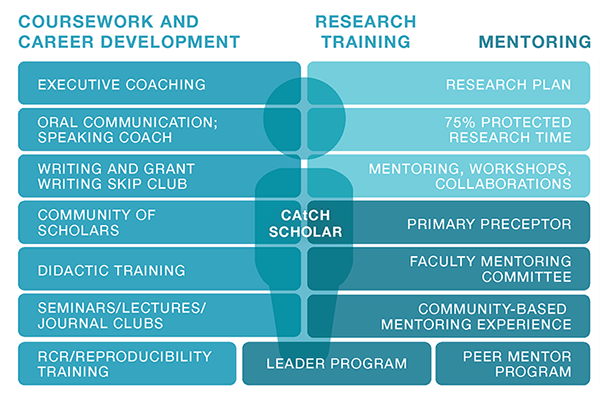Our goal for Duke CAtCH is to provide rigorous scientific research training of highly skilled pediatricians to become independent basic, translational, or clinical researchers in areas critical to child health.

Research Training
All scholars will have a minimum of 75% protected research time during their appointment period. All non-research responsibilities will be limited to no more than 25% of total effort. Research training plans will be individualized to coincide with each scholar’s career development needs and will be developed by the scholar and preceptor, with input from the internal and external advisory boards.
Research Project
To develop research skills, each scholar will have a rigorous research project, with 2 to 3 specific aims, for which the scholar has primary responsibility. Scholar projects can be basic, translational, and/or clinical; must be focused on and directly relevant to child health; and will typically fall into one of the Research Focus Areas.

Coursework and Career Development
Writing Courses and Training
- Writing from the Reader's Perspective, by George Gopen, JD, PhD.
- Effective Communication workshops, led by Joanna Downer, PhD, Associate Dean for Research Development.
- Write abstracts, manuscripts, and grants.
- Present article critiques at journal club meetings and review manuscripts and grant applications.
- Meet individually every 3 to 6 months with Katherine Misuraca, PhD (Director of Research Development, Pediatrics) who will provide 1:1 coaching to assist scholars with preparation of abstracts, manuscripts, and grant applications.
Grant Application Writing
Scholars will be expected to submit their first NIH grant by their second year in the program--either an independent K-award or an independent investigator award such as an R01. Scholars will benefit from:
- The department grant review process, which includes an indepth ‘concept review’, a detailed review of the full grant proposal, and 1:1 grant-writing assistance.
- Scholars K in Pediatrics (SKIP) Club will be available to CAtCH scholars. This program will deliver a structured series of workshops and reviews to support K application development.
- Additional Grant Writing Course: Writing Winning Grant Proposals workshop led by Grant Writers’ Seminars & Workshops.
Oral Communication
- Small group 3-part training session with an external consultant speaking coach to improve oratory skills;
- Presentations at laboratory group meetings; the department annual research retreat, Pediatric Research Rounds, Pediatric Grand Rounds, and to an external advisory board member during the annual external advisory board visit;
- Presentations at national meetings, after abstract submission.
Department Faculty Development Lunch Series
CAtCH scholars will be expected to attend all Department Faculty Development Lunch sessions that are relevant to their respective careers.
Responsible Conduct of Research (RCR) Training
- 5-lecture RCR series provided by the Duke University Trent Center for Bioethics, Humanities, and the History of Medicine.
- Duke School of Medicine Faculty/Staff RCR Program.
- Training through Duke’s Advancing Scientific Integrity, Services and Training (ASIST) Office.
Training in Enhancing Rigor and Reproducibility
- Discussions regarding rigor and reproducibility will occur on a regular basis for all scholars.
- Resources provided through Duke that specifically support enhancing scientific rigor, reproducibility, and accountability; these include iThenticate, LabArchives eResearch Notebook, Data Management Plan guidance, Science Culture and Accountability Plan guidance, and Research Town Halls.
- All scholars will be required to complete the Research Quality and Reproducibility (RCR) interactive online course during their K12 appointment.
Didactic Training
Some scholars will benefit from selected didactic courses to expand upon their prior education and training.
Seminars/Lecture Series/Journal Clubs
Scholars will be required to join a journal club relevant to their research interests.
Community of Scholars
CAtCH scholars will be part of the Community of Scholars (CoS), initiated by the Duke CTSA.
Mentoring
Primary Research Preceptor
Each Scholar will be paired with a primary research preceptor (or 2 if warranted) to serve as a critical resource for the scholars. The scholar will be expected to meet individually with this preceptor at least biweekly and to participate fully in the preceptor’s research group meetings.
Department Mentoring Program
Each scholar will have a Faculty Mentoring Committee that consists of 4 to 6 faculty members, including the CAtCH preceptor and at least 1 internal advisory board member and 1 peer mentor. Mentoring committees will meet with the scholars at least twice per year to assess research progress and complete a Mentoring Committee Meeting Report Form.
Peer Mentoring Program
A group of 13 peer mentors has been identified and agreed to participate. Each CAtCH scholar will be assigned 1-2 peer mentors to serve as a resource for the scholar to discuss, as needed, project development, mentorship, access to resources, among other things. In addition, the entire peer mentor group will meet with all appointed CAtCH scholars once each year as an opportunity to network, seek advice, and develop collegiality among young investigators in the department.
LEADER Program
All scholars will participate in the Duke School of Medicine LEADER Program.
Community-Based Mentoring Experience
All scholars will engage in mentoring a young individual within the Durham, NC community. Mentoring can occur in various forms, including bringing an undergraduate/medical student into the lab for hands-on experimentation, meeting regularly over coffee for mentoring and advice, allowing the mentee to “shadow” the scholar in research endeavors, among others. This will provide scholars with critical training in mentorship and contribute to enhancing the pipeline of physician-scientists within the community. Duke CAtCh will provide scholars with a list of potential programs that would facilitate this experience.